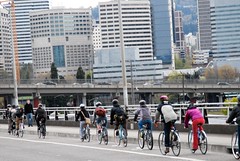
active transportation projects, they’ve
got to adjust their approach.
(Photo © J. Maus)
With the US Department of Transportation’s announcement of TIGER II, a $600 million extension of the stimulus funded TIGER grant program, local active transportation advocates are considering another round of applications.
Our regional Metropolitan Planning Organization, Metro, submitted four active transportation projects totaling $97 million in the first go-round of TIGER grants.
None of those projects received funding*, and since the grant announcement in February, Metro staff has been trying to learn why.
Lake McTighe, the project manager for Metro’s Active Transportation Partnership, has interviewed those who did win major funding for active transportation projects in Indianapolis and Philadelphia.
Indianapolis won $20.5 million to build 4.5 miles of their Cultural Trail. Philadelphia won $23 to complete several trail segments along the Schuylkill River Trail and East Coast Greenway.
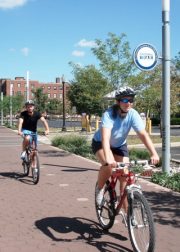
(Photo: IndyCulturalTrail.org)
McTighe says those projects had several things going for them that the Portland area projects didn’t. Key among them was support in the form of matching funds. Both projects already had considerable investment from private foundations. This will be an even more crucial component for TIGER II because the USDOT is requiring a 20% funding match to even be considered.
Money on the table was key to those projects’ success, McTighe says, because, “They could demonstrate they were already working on a project and it was moving along.”
Another lesson learned is the need for project champions. Champions are influential organizations or decision makers in powerful positions – like Congress – who put their full support behind a project. None of the Portland projects had clearly identifiable organizations or politicians behind them. McTighe says the Active Transportation Council – which includes electeds, executives and other power-players from around the region – could fill that role.
And then there was the video. Advocates for the Cultural Trail in Indianapolis put together an inspiring video of their project (watch it below) that provided a compelling overview for why it deserved funding. It became the envy of trail advocates and transportation wonks across the nation.
Indianapolis Cultural Trail from Gail Payne on Vimeo.
Other important lessons McTighe says they plan to keep in mind include, only applying for projects that do not have right-of-way acquisition issues (that means Sullivan’s Gulch and North Willamette Greenway Trails are unlikely to be proposed), and keeping in mind that the feds seem less interested in how a project will impact mode share and more interested in how a new trail or network of bikeways might connect disadvantaged communities to areas of employment.
At this point, McTighe says they haven’t made a decision as to whether they’ll apply for TIGER II. “We’re exploring it and we plan to meet with the City of Portland next week to discuss it.”
If Metro does apply, they’ll stand a much better chance if they pick a specific, iconic project, package it in a way that strikes the right chords at the US DOT, line up a Congressional supporter (Senator Merkley I bet) and then throw their full support behind it… And I wouldn’t be surprised if it had a video to go with it.
*There was one major project in Portland that did get TIGER funding, and it includes a two-way cycle track.
– More on TIGER II from Streetsblog DC and read all the details in the Federal Register.




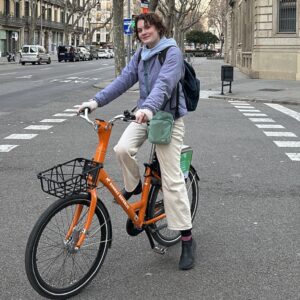
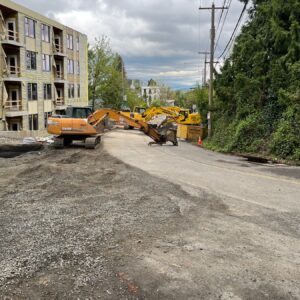
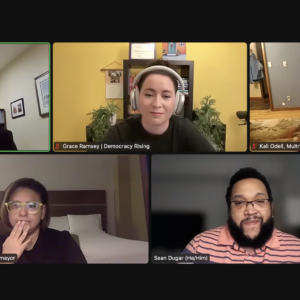
Thanks for reading.
BikePortland has served this community with independent community journalism since 2005. We rely on subscriptions from readers like you to survive. Your financial support is vital in keeping this valuable resource alive and well.
Please subscribe today to strengthen and expand our work.
I encourage Metro to re-vamp for a second run. Just keep in mind that all the other un-founded projects might also reapply in a revitalized manner. Metro will need more than just met the standard set by the Indianapolis Cultural Trail.
Note that focusing on mode share is still a way of serving those that may be disadvantaged in the form of not being able to afford a car or parking. Still, point taken. Certainly those east of 82nd ave are sorely unrepresented in biking infrastructure and improvements.
I would love to see something close to culture trail here. The closest we have is the 3 or so blocks on broadway. I think there is a huge opportunity to better connect N portland, or SE to downtown where there are major problem areas. At least with Tiger I, Portland will get our first 2 way cycle track.
I think is is important to note that not ALL of the Portland region projects were left unfunded. “A federal TIGER grant of $23,203,988 has been awarded to enhance transportation connections in Portland’s Innovation Quadrant.”/a>
I think improving our trailway system is a wonderful, iconic choice for a project to champion. North Portland Greenway, Sullivans Gulch Trail, and Gateway Park are projects that have built a lot of support already.
Just last Friday, Ron Sims, Deputy Director of U.S. HUD, told Portland audiences that sustainability needs to support inclusion, and not increase disparities between the wealthy and the poor.
In order to get funds under the federal Sustainable Communities Initiative, a joint program of HUD, US DOT, and EPA, he said that applicants must show how they are addressing access for low income communities and people of color. TIGER grants are part of that.
The message from Sims was that to be competitive, our region needs to show how we’re addressing equity issues. The next round of TIGER grants provides a real opportunity for our region to focus on funding projects that help give ALL of us access to healthy, walkable, bikable communities.
The Portland Sentinel carried great coverage of Sims’s visit:
http://www.theskanner.com/article/view/id/12041
Mara Gross
CLF